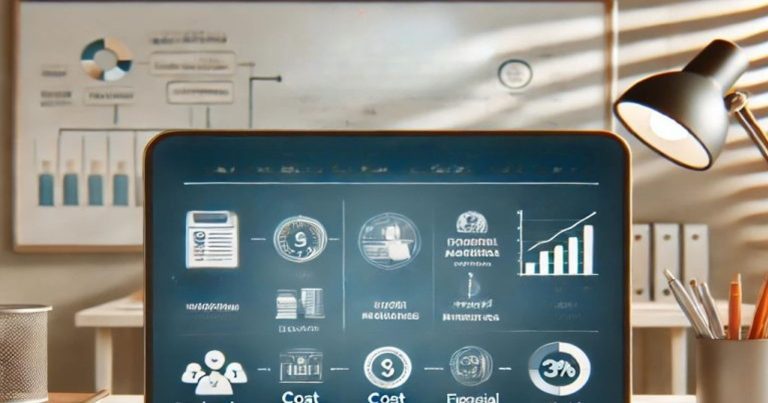The term `management accounting’ refers to bringing the financial information together in the process of being prepared for internal use in business by the managers. The role of management accounting is extremely significant in planning, decision-making, and controlling operations. In contrast with financial accounting, which looks after the needs of the outside entities, management accounting supplies the internal managers with the proper tools to make an educated decision about the business. Management accounting keeps its focus on budget preparation, forecasting, cost control, and performance analysis to increase efficiency and steer toward strategic objectives.
Definition of Management Accounting
Management accounting is the branch of accounting that prepares reports and financial statements for the use of managers in planning, controlling, and decision-making processes. It is forward-looking and dynamic. Performing both analyses-their results being based on financial and non-financial data-accounting for the overall performance of a business. In other words, what really is management accounting? It is internal accounting, dealing with the financial data that are used, inter alia, for the making of some business decisions.
Another definition of management accounting can be derived from the process of identifying, measuring, analyzing, interpreting, and communicating information to help pursue an organization’s goals.
Key Functions of Management Accounting
Management accounting achieves a lot of crucial work supporting day-to-day business decisions. The roles assist managers to plan future actions, to track past performance, and to control operations.
Budgeting
Budgeting is one of the most important aspects of what is budgeting in management accounting. Budgeting is the process of planning financial activity over a given period of time. Managers set objectives and make predictions of revenue and costs.
- It determines financial objectives.
- Assists in allocating resources efficiently.
- Identifies anticipated cash flows.
For instance, a departmental store develops monthly expenses and sales budgets so that operations go smoothly.
Cost Control
Cost control means maintaining strict monitoring of the cost of running the business. With cost analysis, companies are able to save costs.
- Monitors expenses regularly.
- Compares actual vs. expected costs.
- Saves on wastage and boosts efficiency.
It also defines what is working capital in management accounting. Working capital is a difference between current assets and current liabilities. It reflects a company’s short-term financial stability.
| Component | Explanation |
| Current Assets | Cash, Inventory, Accounts Receivable |
| Current Liabilities | Accounts Payable, Short-term loans |
| Working Capital | Current Assets – Current Liabilities |
Decision Support
It is the core of what is referred to as management accounting.And it assists business leaders with sound judgment about pricing, investment, growth, and reducing cost.
Some examples include:
- To accept or not accept a discount proposal on bulk purchases.
- Equipment leasing or buying.
- To incorporate another line of products.
Performance Evaluation
Managers use these tools of accounting to measure performance for different functions or divisions.
- Compares actual and budgeted outcomes.
- Utilizes Key Performance Indicators (KPIs).
- Identifies high and low-performing areas.
Forecasting
Forecasting is estimating future financial results based on current and historical data.
- Estimates sales, profits, and costs.
- Prepares for risks and opportunities.
- Influences investment and expansion decisions.
How Management Accounting Operates?
Like management accounting turns raw financial information value, internal purposes decisions useful are sales, cost, production, and trends on the market. It collects, analyzes and reports on information such that managers can optimally plan and control the operation with the expectation that this leads to enhanced strategies, and eventually better business performance.
Information Collection
In addition to these things, sales data, expense figures, production levels, and market trends may also be quantitative (numbers, prices, receipts) or qualitative (customer feedback, employee feedback). Both types together create an overall picture of the company’s health.
Data Analysis
They seek sales patterns, study any bottlenecks, and discover what other areas are not achieving the expected performance results.
For example:
- A cost analysis might indicate raw materials are too costly.
- Sales data might indicate one area is performing below par.
Reporting to Management
Data is summarized in readable reports such as:
- Budget reports
- Performance summaries
- Profit & loss analysis
These reports are customized for internal purposes, not external regulations.
Decision Making
From these insights, managers make decisions on:
- Eliminating loss-making products
- Investing in advertising
- Employing or laying off workers
This ongoing feedback loop makes business smarter.
Tools and Techniques Applied in Management Accounting
Management accounting employs a variety of tools and techniques to facilitate intelligent business decisions. The techniques assist in cost analysis, budgeting, and projecting future performance. The selection of appropriate tools enhances efficiency and informs long-term strategy.
| Tool/ Technique | Use Case |
| Cost-Volume-Profit (CVP) | Assesses impact of volume and cost on profits |
| Activity-Based Costing | Assigns costs to activities and products |
| Flexible Budgets | Adjusts to activity levels |
| Variance Analysis | Compares actual vs. budgeted figures |
| Break-Even Analysis | Calculates sales needed to cover all costs |
| Standard Costing | Benchmarks expected vs. actual costs |
Managerial Accounting vs. Financial Accounting
Managerial accounting and financial accounting have different functions in a business. While managerial accounting is concerned with internal decision-making, financial accounting is concerned with external reporting. Understanding their differences assists organizations in applying both to control and report financial performance.
| Aspect | Management Accounting | Financial Accounting |
| Purpose | Aids internal decision-making | Reports financial info to external parties |
| Audience | Managers, Internal teams, Investors | Regulators, Shareholders |
| Report Type | Internal reports (budgets, forecasts) | Standard reports (Balance Sheet, P&L) |
| Frequency | As needed – even daily | Periodic – quarterly or yearly |
| Regulation | Not bound by GAAP | Must follow GAAP |
| Focus | Future planning, real-time control | Past performance, historical view |
Key Differences
What does management accounting mean? It’s a dynamic, internal framework for making business improvement.
- Financial accounting is outside.
- Management accounting is inside.
- Reports are tailor-made
- Financial reports have strict formats.
Types of Management Accounting
Management accounting encompasses different types that cater to different business requirements, from cost control to strategic planning. Each of these types offers distinctive insights that enable managers to make more informed decisions. Knowledge of these types enables businesses to select appropriate tools for enhancing performance and profitability.
Cost Accounting
Records and accounts for all the costs of production:
- Direct Costs: Wages, materials
- Indirect Costs: Rent, utility, admin costs
Enables the determination of product prices and spending control.
Budgeting and Forecasting
Anticipates future results and specifies financial constraints.
- Monthly or quarterly budgets
- Revenue and growth forecasts
- Variance between actual and forecasted
Performance Management
Utilizes KPIs and reports to assess success.
- Productivity levels
- Profit margins
- Customer satisfaction
- Revises business strategy accordingly.
Decision Support
Supplies data for strategic decisions of key impact:
- Should we enter a new city?
- Do we outsource or build internally?
- Data provides low risk and greater chances of success.
Financial Analysis and Reporting
Detailed analysis of:
- Return on Investment (ROI)
- Liquidity and cash flows
- Debt-to-equity ratio
- They reveal how powerful the company is financially.
Do Managerial Accountants Need to Follow GAAP?
Managerial accountants are not required to adhere to Generally Accepted Accounting Principles (GAAP) since their reports will be used within the company, not with external parties. Managerial accounting is different from financial accounting; it prioritizes flexibility and relevance rather than compliance. This liberty enables companies to accommodate their accounting to suit decision-making and internal planning more effectively.
Why?
- Internal Focus: GAAP is for external reporting.
- Flexibility: Managers have any means they prefer to use.
- Customization: Reports are customized, not standardized.
Accuracy, relevance, and reliability are still vital. Data needs to assist managers in making smart decisions.
What is Management Accounting FAQs
1. What do you understand about management accounting?
Management accounting refers to the process of financial data analysis to facilitate business decisions for managers. It is concerned with planning, budgeting, and monitoring performance.
2. What is a management accountant in simple terms?
A management accountant assists a business to plan and control its finances. They provide reports that aid in internal decision-making.
3. What are management accounts?
Management accounts are in-house financial reports. They reflect recent performance, cost, and estimates to inform business decisions.
4. What is my management accounting?
Your management accounting is your job or activity of studying and reporting on financial data for business purposes. It enhances in-house operations.
5. What are the different types of accounting?
The primary categories are financial accounting, cost accounting, management accounting, and tax accounting. Each is used for a distinct purpose and audience.


